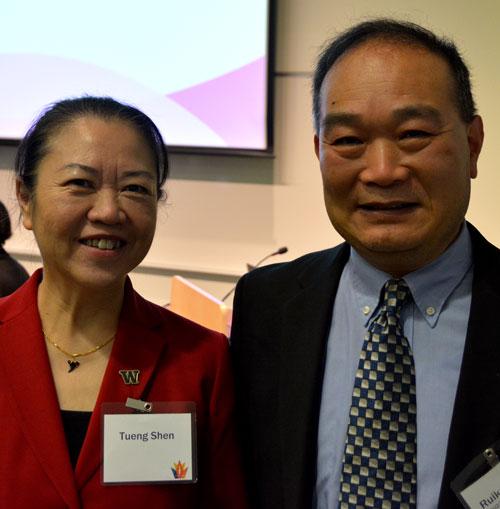
Dr. Ricky Wang elected to Washington Academy of Sciences
Ricky Wang, PhD, George and Martina Kren Endowed Chair in Ophthalmology Research and Professor of Bioengineering and Ophthalmology, has been elected to the Washington State Academy of Sciences (WSAS).
WSAS has elected 36 new members in recognition of their outstanding record of scientific and technical achievement and their willingness to work on behalf of the Academy to apply the best available science to issues within the state of Washington. New members will be inducted at the Annual Members’ Dinner following the 17th Annual WSAS Symposium at the Museum of Flight in Seattle on September 25, 2024.
In electing Dr. Wang to the Academy, it cited his pioneering work in biomedical optics, including the invention of optical microangiography and the development of novel imaging technologies, which have transformed clinical practice, significantly improving patient outcomes. Through his numerous publications, patents and clinical translations, his research has helped shape the field of biomedical optics.”
He joins Professor of Ophthalmology and Graham and Brenda Siddall Endowed Chair Tueng Shen, MD, PhD as an Academy member. Dr. Shen was elected to the WSAS in 2021.
Dr. Wang has been a UW faculty member since 2010. He is a joint Professor in both Departments of Ophthalmology and Bioengineering. In addition to the Kren Chair, Dr. Wang has also held the Washington Research Foundation and David and Nancy Auth Innovator Award in the Department of Bioengineering.
In 2023, Dr. Wang was honored as the UW Medicine Inventor of the Year.
Dr. Wang is widely credited with inventing optical coherence tomography (OCT) angiography, a technique in which blood flow can be measured in all blood vessels in the eye non-invasively. This technique is now a standard testing modality in ophthalmology offices worldwide. His efforts have contributed to retinal findings in patients, including infants, with unprecedented precision, speed, and imaging resolution.
The Wang lab is dedicated to developing novel and clinically useful biomedical imaging techniques for early diagnosis, treatment, and management of human diseases. By exploring the properties of light, tissue, and their interactions, the Wang lab invented, discovered, or pioneered a wide range of techniques, including optical microangiography, full-range complex Fourier domain optical coherence tomography, optical clearing of biological tissue, optical elastography, phase-sensitive optical coherence vibrometry, and multifunctional nanoparticle contrast agents. These methods have found broad application in fields ranging from imaging tissue morphology, tissue blood microcirculation (brain, retina, cochlea, skin, muscle, etc.), imaging tissue mechanical properties, and characterizing embryonic heart development.
Dr. Wang earned his PhD in engineering from the University of Glasgow. He began his academic career in the United Kingdom, holding a professorship at Cranfield University. In 2005, he moved to Oregon Health Sciences University, where he directed the biophotonics and imaging laboratory.
Dr. Wang’s laboratory is phenomenally productive. He has authored or co-authored over 500 papers in peer-reviewed literature. He is currently editor-in-chief of the Biomedical Optics Express journal.
Learn more about Dr. Wang's research at his lab website, https://depts.washington.edu/wangast/.
